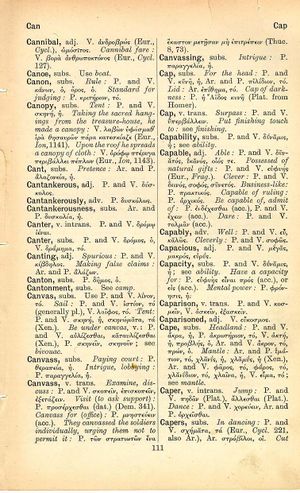caper
οἵ γε καὶ ἐν τῷ παρόντι ἀντιπάλως μᾶλλον ἢ ὑποδεεστέρως τῷ ναυτικῷ ἀνθώρμουν → whose navy, even as it was, faced the Athenian more as an equal than as an inferior
English > Greek (Woodhouse)
v. intrans.
Jump: P. and V. πηδᾶν (Plat.), ἅλλεσθαι (Plat.).
Dance: P. and V. χορεύειν, Ar. and P. ὀρχεῖσθαι.
Latin > English (Lewis & Short)
căper: pri, m. cf. κάπρος, wild boar,
I a he-goat, a goat.
I Lit., Col. 7, 6, 4; Verg. E. 7, 7; Hor. Epod. 10, 23; Ov. M. 15, 305; cf. Varr. ap. Gell. 9, 9; sacrificed to Bacchus (because injurious to the vine), Ov. M. 5, 329; 15, 114; Hor. C. 3, 8, 7.—
II Transf., the odor of the armpits (cf. capra), Cat. 69, 6; imitated by Ovid, Ov. A. A. 3, 193.—
B A star in the left shoulder of the constellation Auriga (also called capella), Manil. 2, 178; 2, 658; Col. 11, 2, 94.—
C The name of a kind of fish found in the river Acheloüs said to make a grunting sound, Plin. 11, 51, 112, § 267.
Latin > French (Gaffiot 2016)
(1) căpĕr,¹² prī, m. (κάπρος),
1 bouc : Virg. B. 7, 7 || odeur forte des aisselles : Catul. 69, 6 || le Capricorne [constellation] : Manil. 2, 178
2 espèce de poisson : *Plin. 11, 267.
Latin > German (Georges)
(1) caper1, prī, m., nach Varro bei Gell. 9, 9, 10 der verschnittene Bock, Ziegenbock, I) eig., Col., Verg. u.a.: dem Bacchus geopfert (weil den Weinstöcken schädlich), s. Orelli Hor. carm. 3, 8, 7. – II) meton., der schweißige Bocksgestank unter den Achseln der Menschen, Catull. 69, 6. Ov. art. am. 3, 193.

